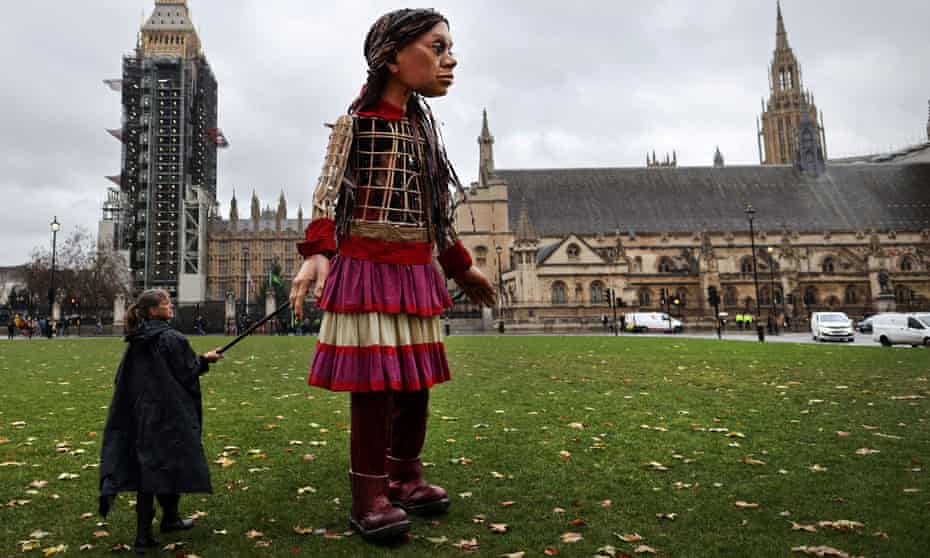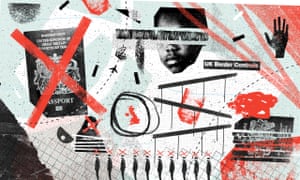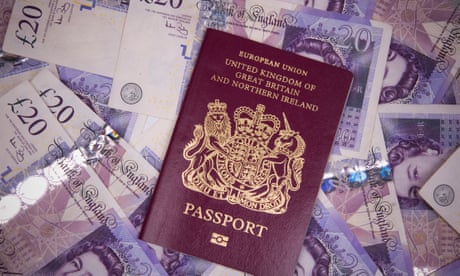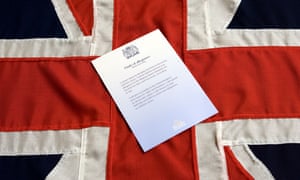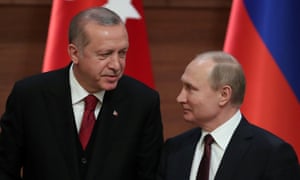
Presidents Tayyip Erdoğan of Turkey and Vladimir Putin of Russia in Ankara. Photograph: Reuters
If we wish to rediscover a sense of political purpose in our era of global finance, big data, mass migration and ecological upheaval, we have to imagine political forms capable of operating at that same scale. The current political system must be supplemented with global financial regulations, certainly, and probably transnational political mechanisms, too. That is how we will complete this globalisation of ours, which today stands dangerously unfinished. Its economic and technological systems are dazzling indeed, but in order for it to serve the human community, it must be subordinated to an equally spectacular political infrastructure, which we have not even begun to conceive.
It will be objected, inevitably, that any alternative to the nation-state system is a utopian impossibility. But even the technological accomplishments of the last few decades seemed implausible before they arrived, and there are good reasons to be suspicious of those incumbent authorities who tell us that human beings are incapable of similar grandeur in the political realm. In fact, there have been many moments in history when politics was suddenly expanded to a new, previously inconceivable scale – including the creation of the nation state itself. And – as is becoming clearer every day – the real delusion is the belief that things can carry on as they are.
The first step will be ceasing to pretend that there is no alternative. So let us begin by considering the scale of the current crisis.
Let us start with the west. Europe, of course, invented the nation state: the principle of territorial sovereignty was agreed at the Treaty of Westphalia in 1648. The treaty made large-scale conquest difficult within the continent; instead, European nations expanded into the rest of the world. The dividends of colonial plunder were converted, back home, into strong states with powerful bureaucracies and democratic polities – the template for modern European life.
By the end of 19th century, European nations had acquired uniform attributes still familiar today – in particular, a set of fiercely enforced state monopolies (defence, taxation and law, among others), which gave governments substantial mastery of the national destiny. In return, a moral promise was made to all: the development, spiritual and material, of citizen and nation alike. Spectacular state-run projects in the fields of education, healthcare, welfare and culture arose to substantiate this promise.
The withdrawal of this moral promise over the past four decades has been a shattering metaphysical event in the west, and one that has left populations rummaging around for new things to believe in. For the promise was a major event in the evolution of the western psyche. It was part of a profound theological reorganisation: the French Revolution dethroned not only the monarch, but also God, whose superlative attributes – omniscience and omnipotence – were now absorbed into the institutions of the state itself. The state’s power to develop, liberate and redeem mankind became the foundational secular faith.
During the period of decolonisation that followed the second world war, the European nation-state structure was exported everywhere. But westerners still felt its moral promise with an intensity peculiar to themselves – more so than ever, in fact, after the creation of the welfare state and decades of unprecedented postwar growth. Nostalgia for that golden age of the nation state continues to distort western political debate to this day, but it was built on an improbable coincidence of conditions that will never recur. Very significant was the structure of the postwar state itself, which possessed a historically unique level of control over the domestic economy. Capital could not flow unchecked across borders and foreign currency speculation was negligible compared to today. Governments, in other words, had substantial control over money flows, and if they spoke of changing things, it was because they actually could. The fact that capital was captive meant they Governments could impose historic rates of taxation, which, in an era of record economic growth, allowed them to channel unprecedented energies into national development. For a few decades, state power was monumental – almost divine, indeed – and it created the most secure and equal capitalist societies ever known.
The destruction of state authority over capital has of course been the explicit objective of the financial revolution that defines our present era. As a result, states have been forced to shed social commitments in order to reinvent themselves as custodians of the market. This has drastically diminished national political authority in both real and symbolic ways. Barack Obama in 2013 called inequality “the defining challenge of our time”, but US inequality has risen continually since 1980, without regard for his qualms or those of any other president.
The picture is the same all over the west: the wealth of the richest continues to skyrocket, while post-crisis austerity cripples the social-democratic welfare state. We can all see the growing fury at governments that refuse to fulfil their old moral promise – but it is most probable that they no longer can. Western governments possess nothing like their previous command over national economic life, and if they continue to promise fundamental change, it is now at the level of PR and wish fulfilment.
There is every reason to believe that the next stage of the techno-financial revolution will be even more disastrous for national political authority. This will arise as the natural continuation of existing technological processes, which promise new, algorithmic kinds of governance to further undermine the political variety. Big data companies (Google, Facebook etc) have already assumed many functions previously associated with the state, from cartography to surveillance. Now they are the primary gatekeepers of social reality: membership of these systems is a new, corporate, de-territorialised form of citizenship, antagonistic at every level to the national kind. And, as the growth of digital currencies shows, new technologies will emerge to replace the other fundamental functions of the nation state. The libertarian dream – whereby antique bureaucracies succumb to pristine hi-tech corporate systems, which then take over the management of all life and resources – is a more likely vision for the future than any fantasy of a return to social democracy.
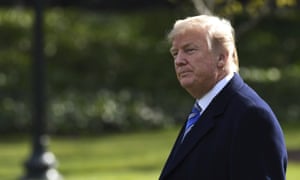
US president Donald Trump in Washington. Photograph: AP
Governments controlled by outside forces and possessing only partial influence over national affairs: this has always been so in the world’s poorest countries. But in the west, it feels like a terrifying return to primitive vulnerability. The assault on political authority is not a merely “economic” or “technological” event. It is an epochal upheaval, which leaves western populations shattered and bereft. There are outbreaks of irrational rage, especially against immigrants, the appointed scapegoats for much deeper forms of national contamination. The idea of the western nation as a universal home collapses, and transnational tribal identities grow up as a refuge: white supremacists and radical Islamists alike take up arms against contamination and corruption.
The stakes could not be higher. So it is easy to see why western governments are so desperate to prove what everyone doubts: that they are still in control. It is not merely Donald Trump’s personality that causes him to act like a sociopathic CEO. The era of globalisation has seen consistent attempts by US presidents to enhance the authority of the executive, but they are never enough. Trump’s office can never have the level of mastery over American life that Kennedy’s did, so he is obliged to fake it. He cannot make America great again, but he does have Twitter, through which he can establish a lone-gun personality cult – blaming women, leftists and brown people for the state’s impotence. He cannot heal America’s social divisions, but he still controls the security apparatus, which can be deployed to help him look “tough” – declaring war on crime, deporting foreigners, hardening borders. He cannot put more money into the hands of the poor who voted for him, but he can hand out mythological currency instead; even his poorest voters, after all, possess one significant asset – US citizenship – whose value he can “talk up”, as he previously talked up casinos and hotels. Like Putin or Orbán, Trump imbues citizenship with new martial power, and makes a big show of withholding it from people who want it: what is scarcer, obviously, is more precious. Citizens who have nothing are persuaded that they have a lot.
These strategies are ugly, but they cannot simply be blamed on a few bad actors. The predicament is this: political authority is running on empty, and leaders are unable to deliver meaningful material change. Instead, they must arouse and deploy powerful feelings: hatred of foreigners and internal enemies, for instance, or the euphoria of meaningless military exploits (Putin’s annexation of Crimea raised the hugely popular prospect of general Tsarist revival).
But let us not imagine that these strategies will quickly break down under their own deceptions as moderation magically comes back into fashion. As Putin’s Russia has shown, chauvinism is more effective than we like to believe. Partly because citizens are desperate for the cover-up to succeed: deep down, they know to be scared of what will happen if the power of the state is revealed to be a hoax.
In the world’s poorest countries, the picture is very different. Almost all those nations emerged in the 20th century from the Eurasian empires. It has become de rigueur to despise empires, but they have been the “normal” mode of governance for much of history. The Ottoman empire, which lasted from 1300 until 1922, delivered levels of tranquillity and cultural achievement that seem incredible from the perspective of today’s fractured Middle East. The modern nation of Syria looks unlikely to last more than a century without breaking apart, and it hardly provides security or stability for its citizens.
Empires were not democratic, but were built to be inclusive of all those who came under their rule. It is not the same with nations, which are founded on the fundamental distinction between who is in and who is out – and therefore harbour a tendency toward ethnic purification. This makes them much more unstable than empires, for that tendency can always be stoked by nativist demagogues.
Nevertheless, in the previous century it was decided with amazing alacrity that empires belonged to the past, and the future to nation states. And yet this revolutionary transformation has done almost nothing to close the economic gap between the colonised and the colonising. In the meantime, it has subjected many postcolonial populations to a bitter cocktail of authoritarianism, ethnic cleansing, war, corruption and ecological devastation.
If there are so few formerly colonised countries that are now peaceful, affluent and democratic, it is not, as the west often pretends, because “bad leaders” somehow ruined otherwise perfectly functional nations. In the breakneck pace of decolonisation, nations were thrown together in months; often their alarmed populations fell immediately into violent conflict to control the new state apparatus, and the power and wealth that came with it. Many infant states were held together only by strongmen who entrusted the system to their own tribes or clans, maintained power by stoking sectarian rivalries and turned ethnic or religious differences into super-charged axes of political terror.
The list is not a short one. Consider men such as Ne Win (Burma), Hissène Habré (Chad), Hosni Mubarak (Egypt), Mengistu Haile Mariam (Ethiopia), Ahmed Sékou Touré (Guinea), Muhammad Suharto (Indonesia), the Shah of Iran, Saddam Hussein (Iraq), Muammar Gaddafi (Libya), Moussa Traoré (Mali), General Zia-ul-Haq (Pakistan), Ferdinand Marcos (Philippines), the Kings of Saudi Arabia, Siaka Stevens (Sierra Leone), Mohamed Siad Barre (Somalia), Jaafar Nimeiri (Sudan), Hafez al-Assad (Syria), Idi Amin (Uganda), Mobutu Sese Seko (Zaire) or Robert Mugabe (Zimbabwe).
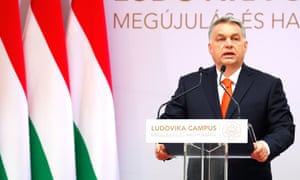
Hungary’s president, Viktor Orbán. Photograph: Laszlo Balogh/Getty Images
Such countries were generally condemned to remain what one influential commentator has called “quasi-states”. Formally equivalent to the older nations with which they now shared the stage, they were in reality very different entities, and they could not be expected to deliver comparable benefits to their citizens.
Those dictators could never have held such incoherent states together without tremendous reinforcement from outside, which was what sealed the lid on the pressure cooker. The post-imperial ethos was hospitable to dictators, of course: with the UN’s moral rejection of foreign rule came a universal imperative to respect national sovereignty, no matter what horrors went on behind its closed doors. But the cold war vastly expanded the resources available to brutal regimes for defending themselves against revolution and secession. The two superpowers funded the escalation of post-colonial conflicts to stupefying levels of fatality: at least 15 million died in the proxy wars of that period, in theatres as dispersed as Afghanistan, Korea, El Salvador, Angola and Sudan. And what the superpowers wanted out of all this destruction was a network of firmly installed clients able to defeat all internal rivals.
There was nothing stable about this cold war “stability”, but its devastation was contained within the borders of its proxy states. The breakup of the superpower system, however, has led to the implosion of state authority across large groups of economically and politically impoverished countries – and the resulting eruptions are not contained at all. Destroyed political cultures have given rise to startling “post-national” forces such as Islamic State, which are cutting through national borders and transmitting chaos, potentially, into every corner of the world.
Over the past 20 years, the slow, post-cold-war rot in Africa and the Middle East has been exuberantly exploited by these kinds of forces – whose position, since there are more countries set to go the way of Yemen, South Sudan, Syria and Somalia, is flush with opportunity. Their adherents have lost the enchantment for the old slogans of nation-building. Their political technology is charismatic religion, and the future they seek is inspired by the ancient golden empires that existed before the invention of nations. Militant religious groups in Africa and the Middle East are less engaged in the old project of seizing the state apparatus; instead, they cut holes and tunnels in state authority, and so assemble transnational networks of tax collection, trade routes and military supply lines.
Such a network currently extends from Mauritania in the west to Yemen in the east, and from Kenya and Somalia in the south to Algeria and Syria in the north. This eats away the old political architecture from the inside, making several nation states (such as Mali and the Central African Republic) essentially non-functional, which in turn creates further opportunities for consolidation and expansion. Several ethnic groups, meanwhile – such as the Kurds and the Tuareg – which were left without a homeland after decolonisation, and stranded as persecuted minorities ever since, have also exploited the rifts in state authority to assemble the beginnings of transnational territories. It is in the world’s most dangerous regions that today’s new political possibilities are being imagined.
The west’s commitment to nation states has been self-servingly partial. For many decades, it was content to see large areas of the world suffer under terrifying parodies of well-established Western states; it cannot complain that those areas now display little loyalty to the nation-state idea. Especially since they have also borne the most traumatic consequences of climate change, a phenomenon for which they were least responsible and least equipped to withstand. The strategic calculation of new militant groups in that region is in many ways quite accurate: the transition from empire to independent nation states has been a massive and unremitting failure, and, after three generations, there needs to be a way out.
But there is no possibility that al-Shabaab, the Janjaweed, Seleka, Boko Haram, Ansar Dine, Isis or al-Qaida will provide that way out. The situation requires new ideas of political organisation and global economic redistribution. There is no superpower great enough, any more, to contain the effects of exploding “quasi-states”. Barbed wire and harder borders will certainly not suffice to keep such human disasters at bay.
Let us turn to the nature of the nation-state system itself. The international order as we know it is not so old. The nation state became the universal template for human political organisation only after the first world war, when a new principle – “national self-determination,”, as US President Woodrow Wilson named it – buried the many other blueprints under debate. Today, after a century of lugubrious “international relations”, the only aspect of this principle we still remember is the one most familiar to us: national independence. But Wilson’s original programme, informed by a loose international coalition including such diverse visionaries as Andrew Carnegie and Leonard Woolf (husband of Virginia), aimed for something far more ambitious: a comprehensive intra-state democracy designed to ensure global cooperation, peace and justice.
How were human beings to live securely in their new nations, after all, if nations themselves were not subject to any law? The new order of nations only made sense if these were integrated into a “society of nations”: a formal global society with its own universal institutions, empowered to police the violence that individual states would not regulate on their own: the violence they perpetrated themselves, whether against other states or their own citizens.
The cold war definitively buried this “society”, and we have lived ever since with a drastically degraded version of what was intended. During that period, both superpowers actively destroyed any constraints on international action, maintaining a level of international lawlessness worthy of the “scramble for Africa”. Without such constraints, their disproportionate power produced exactly what one would expect: gangsterism. The end of the cold war did nothing to change American behaviour: the US is today dependent on lawlessness in international society, and on the perpetual warfare-against-the-weak that is its consequence.
Just as illegitimate government within a nation cannot persist for long without opposition, the illegitimate international order we have lived with for so many decades is quickly exhausting the assent it once enjoyed. In many areas of the world today, there is no remaining illusion that this system can offer a viable future. All that remains is exit. Some are staking everything on a western passport, which, since the supreme value of western life is still enshrined in the system, is the one guarantee of meaningful constitutional protection. But such passports are difficult to get.
That leaves the other kind of exit, which is to take up arms against the state system itself. The appeal of Isis for its converts was its claim to erase from the Middle East the catastrophe of the post-imperial century. It will be remembered that the group’s most triumphant publicity was associated with its penetration of the Iraq-Syria border. This was presented as a victory over the 1916 treaties by which the British and French divided the Ottoman Empire amongst themselves – Isis’s PR arm issued the Twitter hashtag #SykesPicotOver – and inaugurated a century of Mesopotamian bombing. It arose from an entirely justifiable rejection of a system that obstinately designated – during the course of a century and more – Arabs as “savages” to whom no dignity or protection would be extended.
The era of national self-determination has turned out to be an era of international lawlessness, which has crippled the legitimacy of the nation state system. And, while revolutionary groups attempt to destroy the system “from below”, assertive regional powers are destroying it “from above” – by infringing national borders in their own backyards. Russia’s escapade in Ukraine demonstrates that there are now few consequences to neo-imperial bagatelles, and China’s route to usurping the 22nd-richest country in the world – Taiwan – lies open. The true extent of our insecurity will be revealed as the relative power of the US further declines, and it can no longer do anything to control the chaos it helped create.
The three elements of the crisis described here will only worsen. First, the existential breakdown of rich countries during the assault on national political power by global forces. Second, the volatility of the poorest countries and regions, now that the departure of cold war-era strongmen has revealed their true fragility. And third, the illegitimacy of an “international order” that has never aspired to any kind of “society of nations” governed by the rule of law.
Since they are all rooted in transnational forces whose scale eludes the reach of any one nation’s politics, they are largely immune to well-meaning political reform within nations (though the coming years will also see many examples of such reform). So we are obliged to re-examine its ageing political foundations if we do not wish to see our global system pushed to ever more extreme forms of collapse.

Apple CEO Tim Cook and Facebook founder Mark Zuckerberg. Photograph: AP
This is not a small endeavour: it will take the better part of this century. We do not know yet where it will lead. All we can lay out now is a set of directions. From the standpoint of our present, they will seem impossible, because we have not known any other way. But that is how radical novelty always begins.
The first is clear: global financial regulation. Today’s great engines of wealth creation are distributed in such a way as to elude national taxation systems (94% of Apple’s cash reserves are held offshore; this $250bn is greater than the combined foreign reserves of the British government and the Bank of England), which is diminishing all nation states, materially and symbolically. There is no reason to heed those interested parties who tell us global financial regulation is impossible: it is technologically trivial compared to the astonishing systems those same parties have already built.
The history of the nation state is one of perennial tax innovation, and the next such innovation is transnational: we must build systems to track transnational money flows, and to transfer a portion of them into public channels. Without this, our political infrastructure will continue to become more and more superfluous to actual material life. In the process we must also think more seriously about global redistribution: not aid, which is exceptional, but the systematic transfer of wealth from rich to poor for the improved security of all, as happens in national societies.
Second: global flexible democracy. As new local and transnational political currents become more powerful, the nation state’s rigid monopoly on political life is becoming increasingly unviable. Nations must be nested in a stack of other stable, democratic structures – some smaller, some larger than they – so that turmoil at the national level does not lead to total breakdown. The EU is the major experiment in this direction, and it is significant that the continent that invented the nation state was also the first to move beyond it. The EU has failed in many of its functions, principally because it has not established a truly democratic ethos. But free movement has hugely democratised economic opportunity within the EU. And insofar as it may become a “Europe of regions” – comprising Catalonia and Scotland, not only Spain and the UK – it can help stabilise national political upheaval.
We need more such experiments in continental and global politics. National governments themselves need to be subjected to a superior tier of authority: they have proved to be the most dangerous forces in the nation-state era, waging endless wars against other nations while oppressing, killing and otherwise failing their own populations. Oppressed national minorities must be given a legal mechanism to appeal over the heads of their own governments – this was always part of Wilson’s vision and its loss has been terrible for humanity.
Third, and finally: we need to find new conceptions of citizenship. Citizenship is itself the primordial kind of injustice in the world. It functions as an extreme form of inherited property and, like other systems in which inherited privilege is overwhelmingly determinant, it arouses little allegiance in those who inherit nothing. Many countries have made efforts, through welfare and education policy, to neutralise the consequences of accidental advantages such as birth. But “accidental advantages” rule at the global level: 97% of citizenship is inherited, which means that the essential horizons of life on this planet are already determined at birth.
If you are born Finnish, your legal protections and economic expectations are of such a different order to those of a Somalian or Syrian that even mutual understanding is difficult. Your mobility – as a Finn – is also very different. But in a world system – rather than a system of nations – there can be no justification for such radical divergences in mobility. Deregulating human movement is an essential corollary of the deregulation of capital: it is unjust to preserve the freedom to move capital out of a place and simultaneously forbid people from following.
Contemporary technological systems offer models for rethinking citizenship so it can be de-linked from territory, and its advantages can be more fairly distributed. The rights and opportunities accruing to western citizenship could be claimed far away, for instance, without anyone having to travel to the west to do so. We could participate in political processes far away that nonetheless affect us: if democracy is supposed to give voters some control over their own conditions, for instance, should a US election not involve most people on earth? What would American political discourse look like, if it had to satisfy voters in Iraq or Afghanistan?
On the eve of its centenary, our nation-state system is already in a crisis from which it does not currently possess the capacity to extricate itself. It is time to think how that capacity might be built. We do not yet know what it will look like. But we have learned a lot from the economic and technological phases of globalisation, and we now possess the basic concepts for the next phase: building the politics of our integrated world system. We are confronted, of course, by an enterprise of political imagination as significant as that which produced the great visions of the 18th century – and, with them, the French and American Republics. But we are now in a position to begin.
